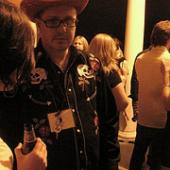Four artistic types, and why they may not get along
Editorial

Theater is like marriage is rumored to be: a lot of fighting and no sex. No; I take that back, having witnessed backstage behavior that essentially amounted to bisexual orgies. Theater is more like one of those relationships where you can't keep your hands off one another, but you also fight constantly and it sometimes seems like you have insurmountable differences in your goals in this relationship.
The truth is, people get into theater for a lot of reasons, and it can be utterly maddening if your approach to theater doesn't dovetail with your other cast members, or director, or the lighting designer, who has yet to be invited to the orgies and is taking revenge by pouring an especially unflattering klieg light on the cast. In my experience, there are a few basic approaches to theater, and all have their upsides and downsides. Each is appropriate in one setting but inappropriate in another. If you start combining these approaches, man, it can get tricky. Let me quickly break them down for you:
The egocentric approach: This is the theater artist who is in the business out of some deep-seated need for attention. There's probably some of that in all of us, even the critics and the PR people, but it's rarely our defining feature. It's just not a very popular behavior to exhibit, as egocentric theater people will base their performance decisions about how big their role is and will tend to pull focus when they get the sense that they are not the center of attention. That being said, the impulse can be a very powerful one in a mature artist, as you need someone who can command the stage when the moment requires.
The social approach: Some people just like the world of theater, and like to be part of it, and especially enjoy backstage parties and getting drinks with the cast and, of course, the orgies. These folks can be a mixed blessing. At their best, they're just an enormous amount of fun to be around. At their worst, they're nothing but -- they don't seem to especially care how good the play is, or even what the play is, and don't really bother with any of the work required to make a play good. It's enough for them to be in a play, and they end up being the sort of person who talks all the way through notes and misses cues due to involved green room games of spin the bottle.
The professional approach: Here we have somebody who is only in it for the quality. They're the ones who show up 15 minutes early on the day of the first rehearsal, already off book. They have no patience for nonsense or meltdowns. They can be pretty terrifying. As actors, they tend to know all sorts of actorly things, like stage combat and accents and how to improvise in iambic pentameter. As stage hands, they have, for some reason, taught themselves the outdated whistle code of the former dockhands who used to raise and lower curtains. As directors, they can be absolute tyrants, screaming at castmembers who show up five minutes late and flinging scripts at performers who forget their lines. They can always be counted on to simultaneously raise the quality of a show and the frustration level of everybody involved.
The artistic approach: These are theater people who really enjoy the process of making art, and likewise enjoy exploring the possibilities of art. Even at their best, they can be bewildering, as they often aren't sure what they want out of a show, or how to get there. The process of creating a play can involve hundreds of dead ends, sudden shifts in approach, scrapping weeks worth of work on a whim, and a final product that is as incomprehensible as it is fascinating. They simultaneously create the language for tomorrow's theater and probably drive more people out of the world of theater than any single other thing, except perhaps finances.
Now, almost nobody is just one of these things, and almost everybody has a little of all of them. But one of these, in my experience, is going to tend to dominate, and with this sort of mix, unless everybody is on the same page, there's going to be fistfights and email wars and people quitting a show. If you cast a professional in a show that's mostly being done for social reasons, they're likely to have a stroke; if you cast somebody who is in theater for social reasons in a professional production, they run a real risk of getting fired. So, as a play's producer or director, it's worth knowing what sort of approach to theater you want and can reasonably expect, and to articulate that as clearly as possible at the outset. And it's also worth knowing what sort of approach tends to be your own when creating a performance, and how comfortable will be in a setting that demands another approach. There isn't much money in theater anyway -- you're probably better off saying no to a project that will leave you unfulfilled and have everybody else angry at you.
You know, you don't actually have to be in a play to throw an orgy.




